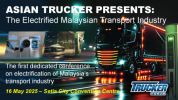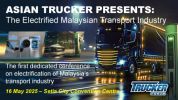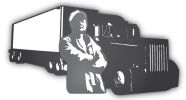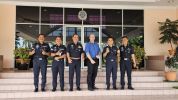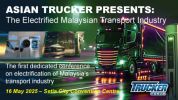Taklimat Keselamatan Bersama Scania
Scania dan Asian Trucker Drivers Club (ATDC) telah bekerjasama mengadakan kursus keselamatan pada 11 November, diadakan di ibu pejabat Scania Malaysia di Shah Alam. Kursus percuma itu telah diadakan untuk ahli ATDC yang merupakan pemandu trak dan bas dari pelbagai syarikat. Acara separuh hari itu bermula dengan perbincangan mengenai pemakanan sihat yang sesuai untuk pemandu yang persekitaran kerjanya yang mencabar.
Salah seorang peserta, Mat Dawi Morshidi berkata ceramah tentang pemakanan itu adalah penting namun sentiasa diambil ringan oleh pemandu. "Kami memandu dengan jauh dan lama, yang memerlukan kami makan dengan betul. Kesihatan yang baik bukan sahaja membolehkan kami melakukan pekerjaan kami dengan baik, tetapi memastikan keselamatan pengguna jalan raya lain juga. Walau bagaimanapun, ramai di antara kita tidak mempertimbangkan hal ini, terutamanya dengan banyak makanan yang lazat walaupun tidak sihat di sekeliling kita," katanya.
Mereka kemudian diberi taklimat keselamatan oleh pelatih pemandu trak Scania, Daeren Avinash, yang bercakap mengenai trak secara amnya dan menggunakan alat ganti yang betul untuk memastikan keselamatan dan ketahanan mesin. Dengan pengalaman selama empat tahun, Daeren telah pergi ke seluruh negara untuk memberi latihan kepada pelanggan Scania, untuk membantu pemandu mereka mengasah kemahiran memandu dan untuk menanam sifat pemanduan yang baik.
Para peserta kemudian dibahagikan kepada dua kumpulan di mana kumpulan pertama diberi peluang untuk memandu trak Scania G460 bersama Daeren dan Chandra Machap. Sementara itu, kumpulan kedua menyertai pertandingan simulator trak Scania. Ia tidak semudah yang difikirkannya, dengan kebanyakan pemandu gagal menyelesaikan cabaran tersebut.
"Ini lebih sukar daripada memandu trak sebenar!" ramai mengadu. Pertandingan ini dimenangi oleh Dzulfarhan Abdul Aziz, Mohammed Qayyum Sazali dan Zainal Awang yang masing-masing menerima beg galas Scania. Selebihnya bagaimanapun tidak pulang dengan tangan kosong kerana masing-masing membawa pulang kit pemandu Scania yang biasanya diberikan semasa sesi Pengenalan Kenderaan untuk pemandu trak Scania (pelanggan).
Pengarah Pembangunan Perniagaan Scania Asia Tenggara, Ian Tan berkata pemandu lori adalah aset tunggal yang paling penting bagi mana-mana pengendali dalam industri logistik. "Mereka menyumbang kepada standard tertinggi dalam pemanduan selamat, jimat dan mesra alam. Oleh itu, ia adalah baik untuk menemu mereka dan juga membantu mereka meningkatkan kemahiran memandu secara berterusan.
"Ia juga merupakan peluang yang baik untuk berkongsi dengan mereka visi masa depan kami dengan menunjukkan kepada mereka prospek teknologi trak platun separuh autonomi. Ini boleh membantu memberi inspirasi kepada orang ramai tentang masa depan pengangkutan yang kini berubah," katanya.
Pemandu lori Afandey Ali telah mengikuti beberapa taklimat keselamatan yang telah dianjurkan oleh kelab tetapi berpendapat adalah penting baginya untuk terus mengikuti acara-acara seumpama ini untuk mengikuti perkembangan terkini.
"Kita menyaksikan banyak perubahan dalam teknologi trak, dan cara memandu tidak lagi sama. Kita tidak boleh menggunakan cara pemanduan yang lama dengan trak moden. Jika kita tidak tahu teknik yang betul, kita boleh membahayakan bukan sahaja diri sendiri tetapi juga orang lain di jalan raya," katanya. Beliau menambah, memandangkan aktiviti-aktiviti ATDC adalah percuma untuk ahli-ahlinya, ia merupakan kerugian besar jika tidak mengambil bahagian. "Latihan ini mungkin memakan kos yang banyak, jadi saya tidak mahu melepaskan peluang dan datang ke acara ini," katanya.

